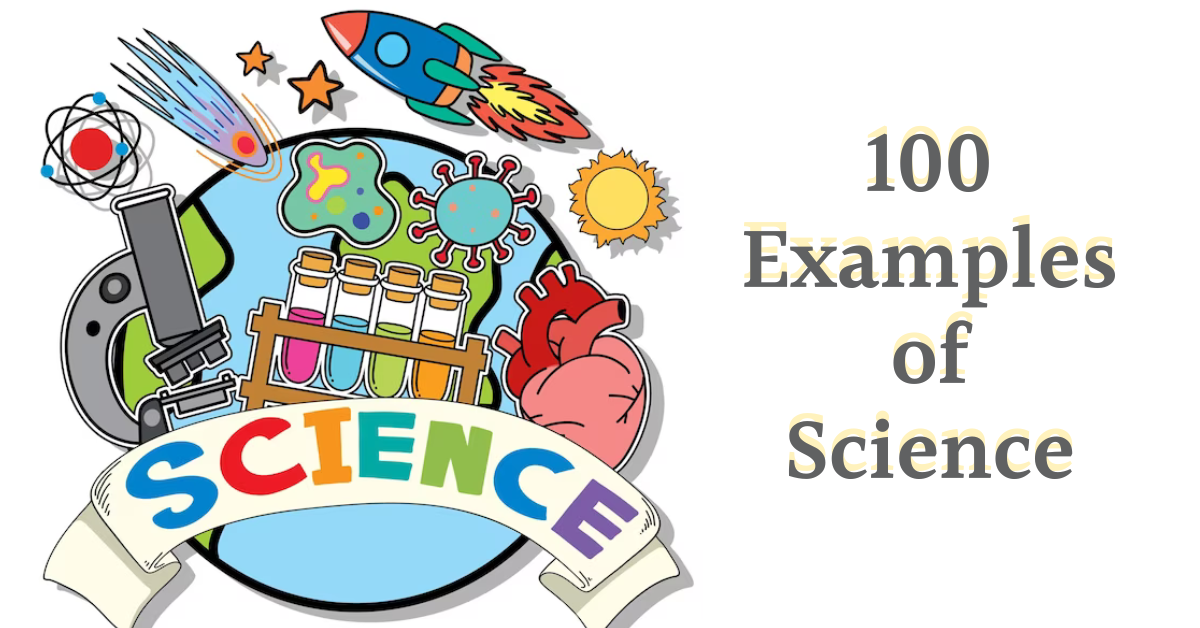Science is the systematic study of the natural world through observation, experimentation, and analysis. It has played a pivotal role in advancing human knowledge and improving our understanding of the universe. Science encompasses various disciplines, each contributing to our understanding of different aspects of nature.

100 Examples of Science
In this article, we will explore 100 examples of science across diverse fields, highlighting the incredible breadth and depth of scientific knowledge.
| Field of Science | Example |
|---|---|
| Physics | 1. Classical Mechanics |
| 2. Thermodynamics | |
| 3. Quantum Mechanics | |
| 4. Electromagnetism | |
| 5. Optics | |
| 6. Astrophysics | |
| 7. Nuclear Physics | |
| 8. Particle Physics | |
| 9. Fluid Mechanics | |
| 10. Relativity | |
| Chemistry | 11. Organic Chemistry |
| 12. Inorganic Chemistry | |
| 13. Analytical Chemistry | |
| 14. Physical Chemistry | |
| 15. Biochemistry | |
| 16. Environmental Chemistry | |
| 17. Medicinal Chemistry | |
| 18. Polymer Chemistry | |
| 19. Quantum Chemistry | |
| 20. Theoretical Chemistry | |
| Biology | 21. Genetics |
| 22. Evolution | |
| 23. Ecology | |
| 24. Cell Biology | |
| 25. Microbiology | |
| 26. Zoology | |
| 27. Botany | |
| 28. Anatomy | |
| 29. Physiology | |
| 30. Immunology | |
| Geology | 31. Paleontology |
| 32. Mineralogy | |
| 33. Petrology | |
| 34. Volcanology | |
| 35. Seismology | |
| 36. Geomorphology | |
| 37. Stratigraphy | |
| 38. Glaciology | |
| 39. Hydrology | |
| 40. Geochemistry | |
| Astronomy | 41. Observational Astronomy |
| 42. Astrophotography | |
| 43. Planetary Science | |
| 44. Cosmology | |
| 45. Stellar Astrophysics | |
| 46. Radio Astronomy | |
| 47. Exoplanet Research | |
| 48. Solar Physics | |
| 49. Galactic Astronomy | |
| 50. Space Exploration | |
| Psychology | 51. Cognitive Psychology |
| 52. Behavioral Psychology | |
| 53. Developmental Psychology | |
| 54. Social Psychology | |
| 55. Clinical Psychology | |
| 56. Neuropsychology | |
| 57. Educational Psychology | |
| 58. Industrial-Organizational Psychology | |
| 59. Positive Psychology | |
| 60. Sports Psychology | |
| Sociology | 61. Social Institutions |
| 62. Social Stratification | |
| 63. Sociology of Religion | |
| 64. Criminology | |
| 65. Urban Sociology | |
| 66. Gender Studies | |
| 67. Family Sociology | |
| 68. Cultural Sociology | |
| 69. Political Sociology | |
| 70. Environmental Sociology | |
| Anthropology | 71. Cultural Anthropology |
| 72. Archaeology | |
| 73. Biological Anthropology | |
| 74. Linguistic Anthropology | |
| 75. Ethnography | |
| 76. Forensic Anthropology | |
| 77. Medical Anthropology | |
| 78. Applied Anthropology | |
| 79. Urban Anthropology | |
| 80. Anthropological Genetics | |
| Economics | 81. Microeconomics |
| 82. Macroeconomics | |
| 83. International Economics | |
| 84. Development Economics | |
| 85. Behavioral Economics | |
| 86. Environmental Economics | |
| 87. Health Economics | |
| 88. Industrial Economics | |
| 89. Public Economics | |
| 90. Agricultural Economics | |
| Computer Science | 91. Artificial Intelligence |
| 92. Data Science | |
| 93. Machine Learning | |
| 94. Software Engineering | |
| 95. Computer Vision | |
| 96. Algorithms | |
| 97. Database Management | |
| 98. Cybersecurity | |
| 99. Networking | |
| 100. Human-Computer Interaction |

These are just a few examples of the vast world of science. From the smallest particles in physics to the complexities of the human mind in psychology, science continues to unravel the mysteries of our existence and shape the way we interact with the world around us. It is a testament to the insatiable curiosity of humanity and our unyielding pursuit of knowledge and understanding. Through science, we have achieved remarkable progress, and the journey of discovery continues, promising an even brighter future for generations to come.

